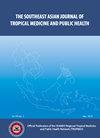碳水化合物类型对衰老、高胰岛素易感性肥胖LA/Ntul//-cp大鼠脑成分和衰老的影响
IF 0.1
4区 医学
Q4 INFECTIOUS DISEASES
Southeast Asian Journal of Tropical Medicine and Public Health
Pub Date : 2023-05-23
DOI:10.9734/ajmah/2023/v21i8841
引用次数: 0
摘要
为了确定表型和碳水化合物类型是否导致肥胖表型的同源LA/Ntul//-cp大鼠脑成分的改变,在1 ~ 10.5±0.5月龄期间,分别饲喂含有54% (w/w)玉米淀粉(ST日粮)或54% (w/w)蔗糖(SUC日粮)的标准等热量饲料(n= 8只/组)。该品系的肥胖表型为早发性慢性高胰岛素血症,无NIDDM,在断奶后早期生长期间伴有肥厚-增生性肥胖。解剖脑组织,并对代表性的等分进行总脂肪、蛋白质和DNA分析。在这两种表型中,喂食SUC的肥胖、肥胖、瘦和瘦鼠的体重都比喂食ST的大。用SUC喂养的大鼠的脑质量比用ST喂养的大鼠的脑质量略低,与瘦、胖、肥胖和饮食有关。瘦肉大鼠的脑总蛋白和DNA含量是肥胖大鼠的一半,在两种表型中,SUC喂养的大鼠略低于ST喂养的大鼠,但脂质含量的百分比与脑质量成正比。在两种表型中,肥胖的鼠体脂肪总量明显大于瘦仔鼠,而SUC喂养的鼠体脂肪总量仅略高于ST喂养的大鼠。这些结果表明,在衰老,高胰岛素易感肥胖表型中,该品系的大脑生长和细胞发育受到损害,当喂食SUC而不是ST时,大脑参数的下降可能与过度脂肪堆积和肥胖常见的慢性神经元炎症综合征的发展有关,导致大脑过早衰老。本文章由计算机程序翻译,如有差异,请以英文原文为准。
Effect of Carbohydrate Type on Brain Composition and Senescence in Aging, Hyperinsulinemia-prone OBESE LA/Ntul//-cp Rats
To determine if phenotype and the carbohydrate type resulted in alterations in brain composition in the obese phenotype of the congenic LA/Ntul//-cp rat, groups (n= 8 rats/group) of male littermate lean and obese rats were fed standardized isocaloric diets containing 54% (w/w) cornstarch (ST diet) or 54% (w/w) sucrose (SUC diet) from 1 until 10.5 ± 0.5 months of age. The obese phenotype of his strain develops early onset chronic hyperinsulinemia without NIDDM associated with hypertrophic-hyperplastic obesity during early postweaning growth. Brain tissues were dissected, and representative aliquots subjected to total fat, protein, and DNA analysis. Body weights of obese >> lean and were greater when fed the SUC than the ST diet in both phenotypes. Brain mass of lean > obese, and diet was associated with modestly lower brain weights in rats fed the SUC than the ST diet. Brain total Protein and DNA content of lean rats were > obese rats and were modestly Lower in SUC than ST fed rats in both phenotypes, but the percent of lipid content was proportional to brain mass. Total body fat mass of obese was significantly greater than occurred in lean littermates and was only modestly greater in SUC than ST fed rats in both phenotypes. These results indicate that brain growth and cellular development is impaired in the aging, hyperinsulinemia-prone obese phenotype of this strain, were further impaired when fed SUC than ST diets, and the decreased brain parameters were likely associated with development of a chronic neuronal inflammatory syndrome common to excessive fat accretion and obesity, resulting in premature brain senescence.
求助全文
通过发布文献求助,成功后即可免费获取论文全文。
去求助
来源期刊

Southeast Asian Journal of Tropical Medicine and Public Health
PUBLIC, ENVIRONMENTAL & OCCUPATIONAL HEALTH-INFECTIOUS DISEASES
CiteScore
0.40
自引率
0.00%
发文量
0
审稿时长
3-8 weeks
期刊介绍:
The SEAMEO* Regional Tropical Medicine and Public Health Project was established in 1967 to help improve the health and standard of living of the peoples of Southeast Asia by pooling manpower resources of the participating SEAMEO member countries in a cooperative endeavor to develop and upgrade the research and training capabilities of the existing facilities in these countries. By promoting effective regional cooperation among the participating national centers, it is hoped to minimize waste in duplication of programs and activities. In 1992 the Project was renamed the SEAMEO Regional Tropical Medicine and Public Health Network.
 求助内容:
求助内容: 应助结果提醒方式:
应助结果提醒方式:


